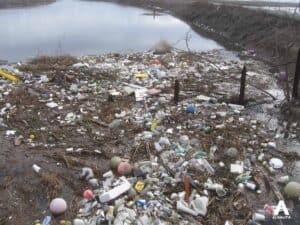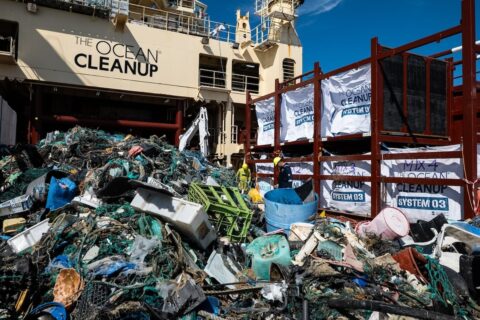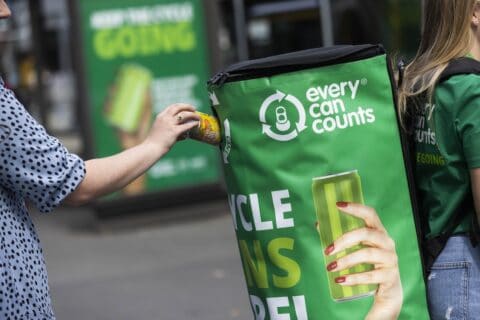
Photo: Algalita Marine Research and Education
A damning new report into the efforts being made by major US corporates and brands to address their responsibilities, fix their packaging and turn back the tide on plastic pollution has found no leaders, only laggards. In-depth analysis of the current crawl towards a circular economy has exposed failings on the part of some of biggest names in retail, consumer goods, and food and beverage.
The report Waste & Opportunity 2020: Searching for Corporate Leadership is published by non-profit leader in shareholder advocacy As You Sow. It reviews progress made by busines to date on reducing plastic pollution. In particular, the study analyses the actions, or inactions, of 50 of the largest US consumer-facing companies.
In the face of growing worldwide concern about ocean plastic pollution, the report concludes that companies are far too slow in adopting responsive actions and promoting reusability, recyclability, or compostability in their packaging. They are failing to shift away from wasteful packaging, towards circular models that prioritise absolute reduction.
Out of the 50 companies in the beverage, quick-service restaurant, consumer packaged goods, and retail sectors, the highest grade was a B- for Unilever. Another 12 companies received C grades, 22 received D grades, and 15 received F grades. The six lowest ranked companies by size of revenue were Walmart, Kroger, PepsiCo, Tyson Foods, Kraft Heinz, and Mondelēz International. The high number of poor and failing grades reflects a lack of basic goal setting, strategy, and planning which must be developed to effectively address the plastic pollution crisis.
Commenting on the findings of the report, lead author and As You Sow Senior Vice President, Conrad MacKerron said:
“Companies have an absolute responsibility to reduce plastic pollution. This report shows that the consumer goods industry is failing to address single-use plastics and take financial responsibility to improve recycling. We were unable to identify leadership companies, but rather found scattered leadership actions.”
Company actions were analysed by As You Sow and graded on six pillars that businesses must implement to address the plastics crisis: packaging design, reusable packaging, recycled content, data disclosure, voluntary support for improving recycling systems, and mandated financial responsibility to improve those systems.
The most progress was evident in pledges to redesign packaging to be reusable, recyclable, or compostable, followed by commitments to increase recycled content and actions to support recycling. There was notably less leadership in the areas of reusable packaging innovation, data transparency, and producer responsibility.
The results indicate that companies have a long way to go to transition from single-use plastics to reusable alternatives, take financial responsibility to fix the US recycling system to dramatically increase recycling yields, and deliver a more circular plastics economy.
“There’s a massive amount of work to be done”, concludes MacKerron. “This report provides a blueprint for what companies need to do to take responsibility for their plastic waste and move us to a circular economy for consumer packaging.”
The key recommendations of the 2020 report are:
- Prioritise setting goals for reducing overall plastic use and using high levels of recycled content;
- Match packaging design to available recycling systems so more packaging can be recycled and not landfilled;
- Refrain from packaging more products in flexible plastic until these materials can be recycled;
- Contribute up to 1% of annual revenue to help finance the $12 billion in infrastructure upgrade and market development needed to dramatically increase recycling yields; plus
- Prioritise long-term contracts with recycling processors to signal serious commitment to use of recycled plastic feedstock and create a circular economy for plastic packaging.
As You Sow is a nonprofit organization that promotes environmental and social corporate responsibility through shareholder advocacy, coalition building, and innovative legal strategies.
Further Reading:
- Download the full Waste & Opportunity 2020: Searching for Corporate Leadership report.
- Discover more about associated emissions in Plastics and Climate: The hidden costs of a plastic planet, published by the Centre for International Environmental Law (CIEL).
- More about the causes and origins of the plastics pollution crisis in How Big Oil and Big Soda kept a global environmental calamity a secret for decades, published in Rolling Stone.
- More about As You Sow.
- More on As You Sow’s work on plastic pollution.
- More about youth education charity Algalita campaigning for a plastic-free future.
- News about how Consumers are willing to pay more for sustainable packaging.
>>> Do you have sustainability news to broadcast and share? If you would like to see it featured here on SustMeme, please use these Contact details to get in touch and send us your Press Release for editorial consideration. Thanks.






